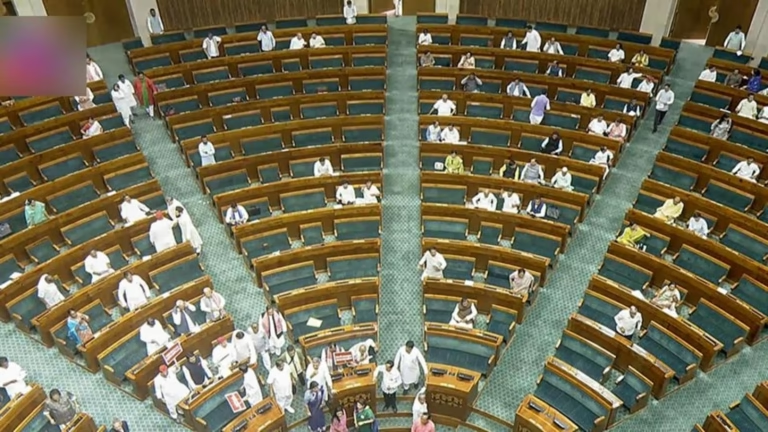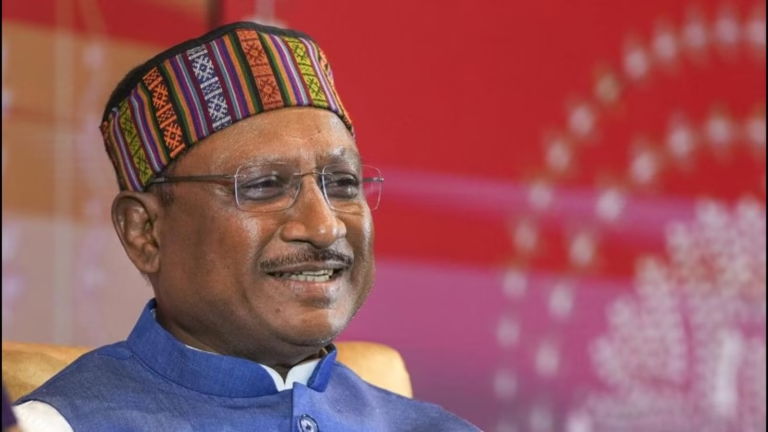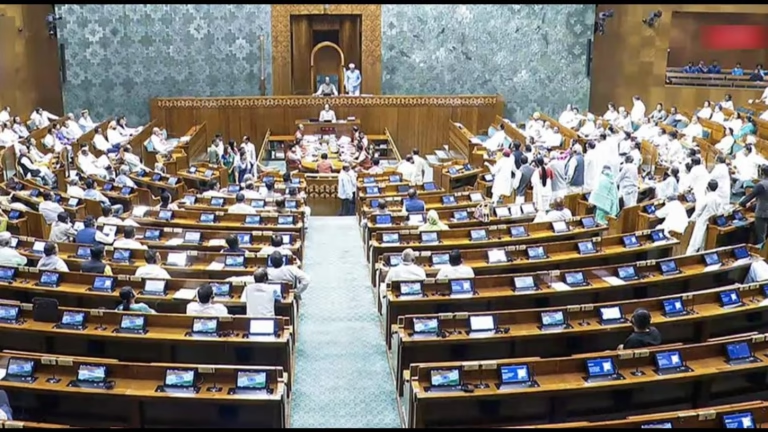The first phase of the controversial special intensive revision (SIR) in Bihar excised 6.56 million names from the state’s voter rolls. The exclusions have generated a political firestorm and reverberated in Parliament and the Supreme Court. But another key facet are the 72.4 million people who managed to fill their forms. Across five districts, HT attempts to sketch the contours of the exercise, shaped by identities, differing access to government services, migration and socioeconomic status.
Chandan Das, Tilhari Village
A flight of three steep steps leads a visitor to the meeting room of Tilhari village chief Shakunta Devi and her husband, Chandan Das. Under framed faces of Bhagat Singh, BR Ambedkar and Ravidas, the room teems with clots of people anxious about their names on the electoral roll – one has a brother toiling away in Hyderabad who cannot come back to fill the forms, a second has no document other than Aadhaar card in her name since her marriage in this village five years ago, and a third is worried that she might have missed her BLO and will be marked absent.
In this peri-urban village of 900-odd people dominated by marginalised castes, a white sheet of paper stamped with the panchayat logo, signed by Das, and a photograph of the applicant affixed is lucrative. Das has signed roughly 250 of these letters since July 1, filling the gap in access to formal documentation.
“In our village, most are poor. The problem here is birth certificates and only 10% of people have caste papers. So what else can we do to help them?” asked Das, who was once associated with the Communist Party of India (Marxist-Leninist).
In his early 30s, the husband of the village chief unofficially executes many of the official functions of his wife. He had thought that the publication of the draft roll on August 1 would mean an end to the frenetic pace of work. “Not a lot of names in this village were deleted so that’s a relief. It means the letters worked,” he said.
But now, there is a new problem.
“Naam bohot ka gadbad kar diya hai (they’ve made a lot of mistakes with the names) – Rai in place of Ram, father-in-law in place of father,” Das said. “I went through the draft list for an hour with the BLO and found 6-7 such mistakes,” he added.
In front of him is Rekha Devi, whose father-in-law Yaddu Manjhi’s name is misspelt. Next to her is Ruby Devi whose husband’s name Bhagiran Manjhi is now spelt as Jhageru Manjhi. Behind them on the floor are Ram Bhuvan whose name is spelt as Rai Bhuvan and Rukmini Devi, now erroneously spelt as Kamini Devi. They all have to fill a form and submit it to the BLO before September 1. Such errors are not new but the stringent SIR process has locals worried. “We are illiterate so we have come to request pradhan sahab to help us,” said Rekha Devi. It’s back to the grind for the young politician.
Kaiser Alam, Asura village
The tranquil waters of the Kankai river hug the international border between India and Nepal through most of its course, before spilling into the Mahananda in Bihar’s Kishanganj district. Its banks on either side are dotted with hundreds of villages and the occasional makeshift bridge – like the one on the edges of Asura village. In this part of the world, formal jobs are scarce and most people are manual labourers, farm hands or fishers. The few skilled people either migrate out of the state or the country for decently paying jobs. Kaiser Alam, a stonemason, is one of them. Courtesy his travel, the 41-year-old has a passport – one of the 11 documents the Election Commission of India is accepting as proof of address.
But his wife, Mohsina Khatun, has largely remained at home. She doesn’t have a passport or an educational certificate. For people like her, the most-popular choice of document is the niwasi or the permanent residency certificate, which is issued by the block office and usually takes between 10 and 15 days. A filled form, a letter from the panchayat and Aadhaar card is all that usually takes. And a bit of luck.
Khatun fears her luck might have run out. The mother of five cast her vote in the 2020 assembly polls and the 2024 Lok Sabha polls. “I applied for it (the certificate) soon after the declaration of SIR on July 3; since then I have been frequenting the block office but till now I haven’t got it,” said Alam.
This is not uncommon. Across many blocks in Kishanganj, Purnia, and Araria districts, officials temporarily froze the issuance of new certificates in July and August after seeing a sharp spike – tenfold on average – in applications. While this helped ease verification stress, it hurt many applicants. “I am worried that my wife will be deprived of her franchise,” Alam said.
But her luck might turn again. Last week, the Supreme Court told the EC to start allowing the submission of Aadhaar details..
Ajit Rishi, Palasi village
Since his teenage years, Ajit Rishi has been somewhat of a busybody.
In his village of Palasi in Bihar’s Araria district, most people are migrant labourers and hail from the Mahadalit Musahar caste. Rishi himself is Dalit, having appended Rishi to his name in an attempt to dispel the stigma binding the impoverished community once forced to eat rats to stave off hunger.
Rishi spent most of his teenage years in odd jobs. By his early 30s, he had become a ward member in the panchayat, leveraging his community ties and numerous small favours he was owed.
Literacy remains low among the 537 voters, most of whom are from the Dalit communities and work as day labourers. “You can understand that very few people here understood what the papers meant when the SIR forms were first given out,” said Rishi.
The partially pre-filled forms were distributed by the local schoolteacher BLO. But when he came back to pick up the documents days later, he refused to accept Aadhaar or voter identity card – most villagers had photocopied these two and affixed it to the forms – as supporting documents.
“First they said fill only the form, then said give it with documents. Then, they said only the form will do. After that, they said they’ll come back for a document check. For us villagers, it was very confusing,” said Tuntun Rishi, a resident.
That’s when Rishi stepped in.
“We formed a strategy. For some, I helped them fill the form in Hindi and added their Mahadalit certificate or card myself. For some others, I filled out the form and asked them to add as many documents as they could, especially any card they had got as beneficiary for a SC-specific scheme. We then spoke to the BLO to accept it,” he said.
But there were still outliers. Farmhands Baidyanath Rishi and his wife Minti Devi were both in Punjab, having migrated up north for the harvest season, and only their small children were back at their village home in Palasi.
“There were at least 30-40 people from our samaj (community) who were out because the wages at this time of the year are good,” said Rishi.
Some responded to missives by their family members but many didn’t – in any case, many simply didn’t have the kind of documents the BLO was looking for. As July entered its final lap, the pressure on Rishi was mounting as people frequented his house with their anxieties about being struck off the rolls. In a village election, a disgruntled household is enough to swing the polls away from a candidate. Rishi had to keep everyone happy.
“In every village, there is a vikas mitra appointed by the state government to help Mahadalits access official schemes. He has a list of families and dependents. We told him to give us a copy of the list and shared it with the BLO, who we told to mark voters based on that list,” said Rishi. “People who are outside and couldn’t fill their form but were Mahadalit were also helped by this parivarik suchi (family listing),” Rishi said.
The workaround sidestepped the document soup as the BLO directly picked up names from the list. “For some people, who didn’t even have Aadhaar, the parivarik suchi was enough,” he said.
It was a relief for Rishi, who was increasingly getting anxious about lost labour wages for the many hours he spent filling forms, effectively securing his votes. “An hour lost means ₹400 gone,” he said.
His work, however, is not done yet. Sarima Devi and her husband Jittan Rishi are at sea because he is a migrant labourer who has lately stopped returning home, sending between ₹2,000 and ₹3,000 occasionally for her upkeep. “My husband has not filled out the form. Plus my name is not on any welfare document so what do I submit?” she asked.
Rishi sighed. It is not uncommon in the countryside for a woman to be abandoned by her migrant husband. But for now, getting her name into the voter list is of bigger importance than her personal tragedy. “I’ll talk to someone,” Rishi said.
Abdul Javed, Mahendrapur
For decades, brothers Abdul Javed and Abdul Hamid shared a common mud courtyard between their huts, a separate kitchen room off to the right, and two string cots outside to entertain evening visitors. In the village of Mahendrapur, the farm hands lived off the main lane, the entrances of their houses marked by dented sheets of tin stapled together in the likeness of a gate.
When their children were in school, it became clear that there were no jobs available in the countryside to support the family. Javed’s two sons quickly migrated – first to state capital Patna and then to Karnal town in Haryana, where they alternate between working on construction sites and agricultural fields. Pay is more regular and at least four times the rate given in Bihar.
“There are six people in our house and eight people in Hamid’s house. It was all going well when the SIR was announced,” Javed said.
After one week of confusion, the household swung into action. Now in his 70s, Javed requested a young man from the village to help them understand what was being asked. He then called his elder son Sabbar to spare a day from his otherwise gruelling manual labour schedule, and click photos of every document available with him. As the elder brother, he held all the documents (which included passports because the brothers earlier worked as contract labour in west Asia) and sent photographs of every document on WhatsApp.
“I went to the block headquarters and got the photos printed. I then used the details to fill the form myself on their behalf. The BLO accepted them,” said Javed.
Here, every household has more than one member working outside – either in an industrial town in India, or in west Asia. Complicating their already difficult lives are increasing polarisation and stereotypes about Muslims, especially those who speak Bengali. This is all too apparent next door, in Chatia village, where most young men leave home at 18.
Ruksana Khatun and her friend Jainur Khatun have helped fill the forms of several male relatives, including their husbands and children, who are in Haryana working in tile factories. “They only take scanned copies of Aadhaar with them, so we were lucky that the rest of the cards were all at home. We just filled the forms thanks to them,” said Ruksana.
Almost everyone here is a migrant, but the share of Muslim people has surged in recent years, bringing with it anxieties and sometimes unfounded allegations about infiltration. In Rampur Kodarkatti, where Muslims make up two-thirds of the population, village chief Rajesh Kumar Singh is a proponent of these theories. Two years ago, he hit the local news when he contacted the police about a man he alleged was Bangladeshi. “Bengali and Bangladeshi here are the same. 70% came here after Bangladesh was born and changed our demographic,” he said.
Girija Devi, Naya Tola
For most of her 47 years, Girija Devi has been on the move. Born in a village in Uttar Pradesh near the border with Bihar, Devi was married in Gopalganj district to her husband, Ramprit Prasad, but the first home she built, in Tangrahi village, was engulfed by the Gandak river during a seasonal flood. Bankrupted by the tragedy, Devi and her husband moved to higher ground, to a village named simply as Naya Tola or new neighbourhood – an amalgam of people who’d moved here from various parts of the district after being rendered homeless by Bihar’s monsoon sorrow.
A mud-and-cement embankment protects most of the settlements in Naya Tola, but also makes life difficult for people like Devi who double up as farmhands. In this slushy landscape, building roads is difficult and the moped is the perfect all-weather vehicle. But the proximity to Kuchaikote town helps in securing odd jobs. For the labourer couple, a day’s work means between ₹300 and ₹400.
But for the past month, earning has been somewhat sporadic because the couple has skipped days hunting for documents to affix to their electoral forms. Prasad had thought that a family member’s name in the land records, or Khatian, would suffice, but has been told by the BLO that it has to be his own name for the document to count. “Neither I nor my wife are educated. I have given my Aadhaar but they’re asking for my birth certificate. Where will I get it?” he asked.
Devi faces a bigger conundrum. Women have been asked by the authorities to affix proof that traces their lineage to their fathers. All Devi has is proof of her marriage. “My parents are dead, and in any case, who will give me any proof there? Women don’t get ration cards made in their name,” she said.
Across the state, the controversial SIR has erected hurdles to confirm one’s place in the voter rolls. But women such as Devi face an additional set of hindrances, because they typically reside away from natal homes from where they have to trace lineage and access documents. Devi doesn’t care much about voting or whether her name stays in the rolls. But she’s worried about spillover effects. “Who will put my name back in the rolls once it’s struck off? And what’ll happen to my ration or schemes?” .





